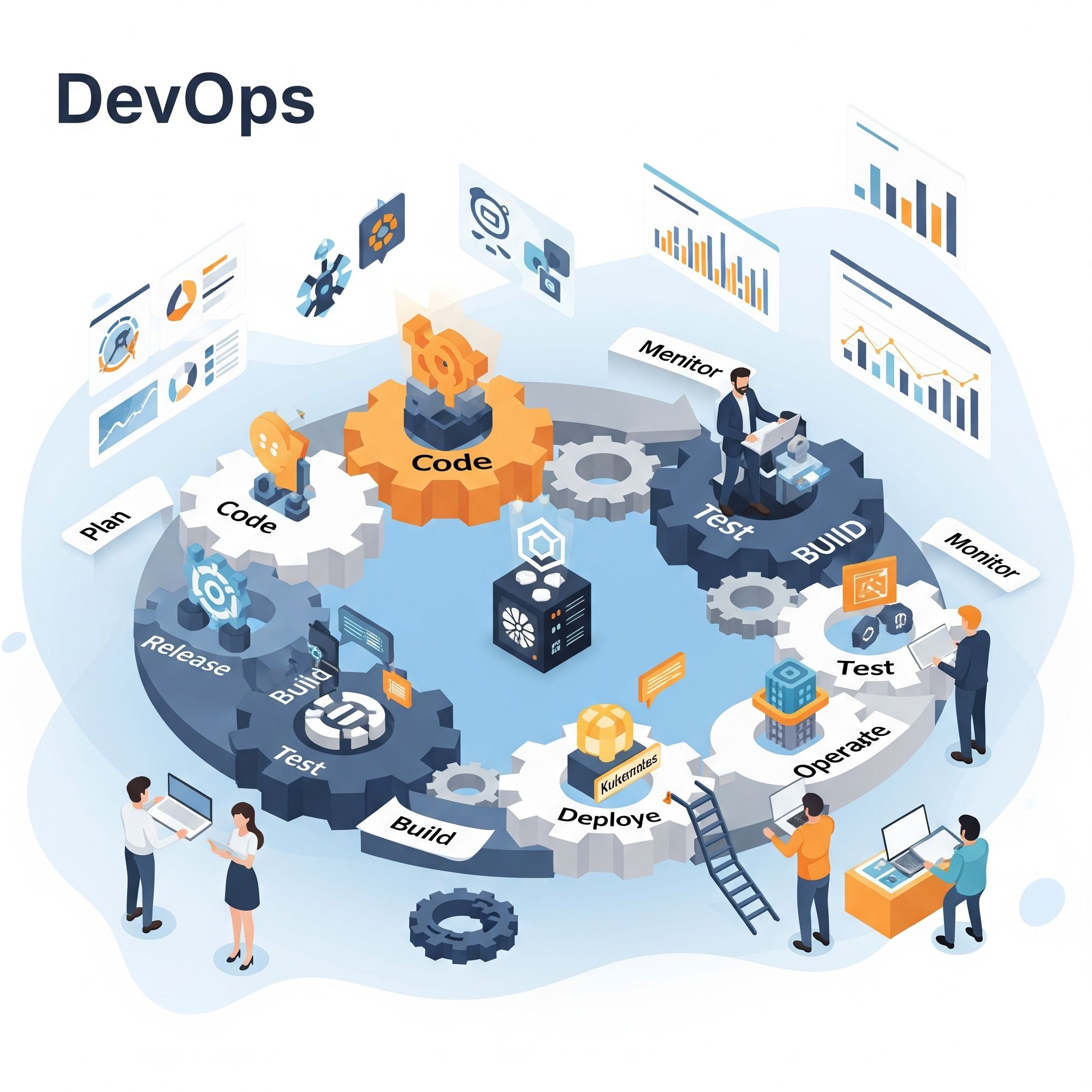today’s fast-paced tech world, DevOps has become one of the most essential concepts in software development. But what exactly is DevOps?.In simple terms, it is a blend of Development and Operations .a culture that focuses on collaboration, automation and also continuous delivery to make software development faster, better, and more reliable.

What is DevOps?
DevOps is not just a job role or a tool. It iss a mindset and workflow that brings together development code creators and operations infrastructure managers into one team.
In traditional software development models, developers would write the code, while the operations team was responsible for deploying and maintaining it. As a result, this separation often led to silos, delays, and frequent miscommunication between teams
DevOps breaks this barrier by fostering collaboration. Instead of working in isolation, both development and operations teams now work together seamlessly. By leveraging automation and modern tools, they can deliver software quickly, reliably, and continuously
Before DevOps vs After DevOps
Imagine this…
You’re a developer working on a cool new feature.
After finishing your code, you email it to the operations team and wait for them to deploy it.
But then they reply, saying
Great, we’ll deploy it next week.
Next week comes… and the app crashes. The Ops team says,
Your code broke the server.
You reply,
It works on my machine!
A full day is wasted pointing fingers. No one wins. The feature is delayed. The users are angry.
This was software development before this approch.
Now Imagine This…
The next time, Rahul wrote his code and simply pushed it to GitHub.
Immediately, a pipeline started:
Tests ran automatically
- Build completed
- Code deployed to staging
- Feedback collected
- Deployed to production in minutes
No waiting or emails. No arguments.
Instead, just smooth, fast, and reliable software delivery. exactly what modern teams need.
Welcome to the world of Developement + Operations.
Evolution of DevOps: How It Changed Everything
DevOps didn’t come out of nowhere and also It was born out of frustration.
Before DevOps: The Waterfall Pain
- Dev teams and Ops teams were separate.
- Deployments took weeks or months.
- Lots of manual testing, slow feedback.
- Developers threw code “over the wall” to Ops.
DevOps Emerges (2009–2015): Collaboration Begins
- Inspired by Agile + Lean principles.
- Focused on:
- Automation
- Continuous Integration
- Faster Deployments
- Monitoring + Feedback Loops
- Tools like Jenkins, Docker, and Git became the norm.
Backbone of Modern Tech
DevOps is the backbone of modern technology. In fact, every top company—including Netflix, Amazon, and Google—relies on DevOps to deliver faster and more reliable software.
Moreover, advanced concepts like GitOps, DevSecOps, and Platform Engineering are rapidly gaining popularity, shaping the future of software development and operations.
Additionally, cloud-native tools such as Kubernetes, Terraform, GitHub Actions, and many others now dominate the DevOps landscape, enabling teams to scale efficiently and automate everything.
Lifecycle : 8 Key Stages
The DevOps lifecycle has 8 important phases:
- Plan – Understand requirements, write user stories
- Develop – Write and test the code
- Build – Compile and prepare for deployment
- Test – Automatically check for bugs or errors
- Release – Final version is approved
- Deploy – Push changes to production
- Operate – Monitor system performance
- Monitor & Feedback – Collect feedback and improve
🔁 This cycle keeps repeating for fast and also safe improvements.
Why it is So Powerful
- Faster delivery: Deploy updates daily or even hourly
- Better collaboration: No more blame games between Dev and Ops
- Fewer bugs: Thanks to automated testing
- Continuous improvement: Every change is monitored and improved
- Automation everywhere: Saves time and also reduces human error
Real-Time Usage:
Imagine this scenario: you’re building a website.
Without DevOps, you complete the code and hand it off to another team. Eventually, after days or even weeks of waiting, they deploy it—often manually—leading to delays, errors, and frustration.
Now contrast that with DevOps.
With this modern approach, you simply push your code, and within seconds, it is automatically tested, integrated, and deployed through CI/CD pipelines.
As a result, feedback is faster, releases are smoother, and teams can innovate without bottlenecks.
Popular Tools
| Category | Popular Tools |
|---|---|
| Version Control | Git, GitHub |
| CI/CD Pipelines | Jenkins, GitHub Actions, GitLab CI |
| Containers | Docker |
| Orchestration | Kubernetes |
| Cloud & Infra | AWS, Terraform, Ansible |
| Monitoring | Prometheus, Grafana |
Next Steps
- Follow our tutorials and blogs
- Subscribe to InsightClouds for weekly updates
- Subscribe our DevOps youtube channel
Leave a Reply